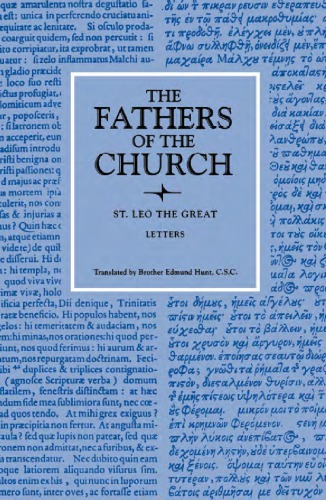

Most ebook files are in PDF format, so you can easily read them using various software such as Foxit Reader or directly on the Google Chrome browser.
Some ebook files are released by publishers in other formats such as .awz, .mobi, .epub, .fb2, etc. You may need to install specific software to read these formats on mobile/PC, such as Calibre.
Please read the tutorial at this link: https://ebookbell.com/faq
We offer FREE conversion to the popular formats you request; however, this may take some time. Therefore, right after payment, please email us, and we will try to provide the service as quickly as possible.
For some exceptional file formats or broken links (if any), please refrain from opening any disputes. Instead, email us first, and we will try to assist within a maximum of 6 hours.
EbookBell Team

4.4
42 reviewsAs the vestiges of the Roman political machine began to collapse in
the fifth century A.D., the towering figure of Pope St. Leo the Great
came into relief amid the rubble. Sustained by an immutable doctrine
transcending institutions and cultures, the Church alone emerged from
the chaos. Eventually, the Roman heritage became assimilated into
Christianity and ceased to have a life of its own. It would be
practically impossible to understand this monumental transition from
Roman world to Christendom without taking into account the pivotal role
played by Leo—and not the emperor—who went out to confront Attila and
Hun. It was Leo who once averted and on another occasion mitigated the
ravages of barbarian incursions.
As significant as his
contribution was to history, Leo had an even greater impact on theology.
When partisans of the monophysite heresy had through various
machinations predetermined the outcome of a council held at Ephesus in
450, Leo immediately denounced it as a latrocinium (robbery) rather than a concilium
(council). A year later—with cries of "Peter has spoken through
Leo!"—the ecumenical Council of Chalcedon, a pillar of Catholic
Christianity, adopted in its resounding condemnation of monophysitism
the very language formulated by Leo. Pope Leo also developed the most
explicit and detailed affirmations known up to that time of the
prerogatives enjoyed by successors if St. Peter. Many theological
principles find their clearest, and certainly their most eloquent,
expression in his sermons.
Leo spoke with all the refinement of a
Roman orator, without the pagan trappings, and thus epitomized a
Christian appropriation of the classical heritage. In the midst of it
all, however, Pope St. Leo thought of himself simply as the humble
servant of those entrusted to his care.
This volume presents the first English translation of the complete sermons.